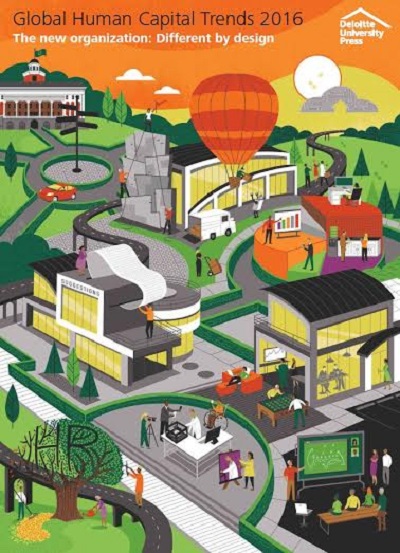
The largest ever global studies of workforce, leadership and HR challenges, conducted by Deloitte, has found for the first time that 45% of companies surveyed are either currently involved in a restructuring or are planning one.
The 'Global Human Capital Trends 2016' survey looked at more than 7,000 HR and business leaders in 130 countries, finding the fact that effective organisations are seen to be built around highly empowered teams and new models of management reflected in the discovery that 39% of respondent businesses are in the middle of restructuring and a further 6% have such a process in the pipeline.
Deloitte's research, spanning 130 countries, revealed 10 trends in organisation design and culture; in learning, leadership and workforce management; and within the HR function itself.
The Call for New Organisation is Being Brought on by Technology and Business Disruption
The research showed that companies are making efforts towards becoming agile, collaborative and customer-focused by employing 'networks of teams' type models and distancing themselves from those perceived as more hierarchical and functional. However, it was found that only 21% of business and HR executives view themselves as at ease with the process of building cross-functional teams, with only 12% holding a true understanding of how their staff inter-relate and work together.
It was also discovered that millenials focused on personal growth are currently working side-by-side with baby boomers putting off their retirement. Those looking for rapid career growth and flexible work arrangements have seen changes arise in the employer-employee relationship, fuelled by the digital workplace. 74% of executives felt digital HR, encompassing a redesign of HR tools and services centered around digital technology, is a top priority, with 42% of companies involved in reconfiguring their HR systems to support mobile, just-in-time learning. 59% are attempting to render HR systems more convenient for employees to use by shifting them to mobile.
Another major new trend in the form of 'design thinking' has redirected companies towards employee-focused strategies for managing, supporting and training their workforce. Indeed, businesses are drawing on employee behaviours as a basis for establishing interventions, applications and tools, as a means of rendering these easy-to-use, stress-reducing and productivity-boosting, making design thinking a top priority for 79% of executives for 2016.
Business and HR Leaders Focus on Employee Experience
Business and HR leaders appear keen to attract and keep top talent, with 86% of respondents perceiving challenges with corporate culture as 'important' or 'very important'. Challenges with employee engagement were similarly rated by 85%.
Indeed, this new spotlight has led to the creation of new roles within HR such as 'chief experience officer' and 'chief listening officer'. Four in ten executives believe their companies are ready to address the HR skills gap, which constitutes a 25% increase from 2015, whilst people analytics is gaining momentum as a means of improving this culture and engagement crisis. In 2016, 8% of executives saw themselves as fully capable of developing predictive models, against 4% the year before.
Classic Management Model is Falling by the Wayside
56% of companies perceived themselves as ill-prepared to meet leadership needs, with 22% of those surveyed having no leadership programmes for millenials. As a result, 89% of executives are subverting the classic leadership pyramid and will be looking to employ strengthening and reengineering measures to improve organisational leadership in the year ahead.
Photo from Deloitte Luxembourg








